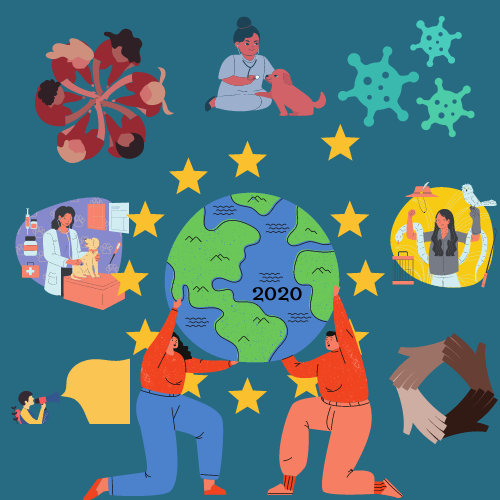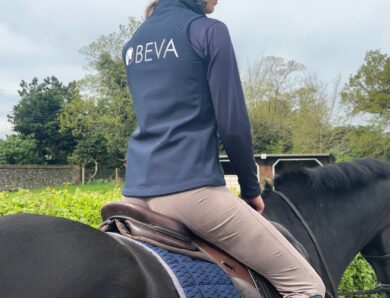
2020: a year in the veterinary profession
Alexia Yiannouli
22.01.2021
This last year has presented a seemingly endless torrent of challenges for the veterinary profession, as it did for much, if not all, of the world. The pandemic has all but dominated this past year, with some describing it as a “coronacoaster” – a phrase used, quite aptly, to describe the unparalleled events of the last 10 months. For many, the words “work from home” became a phrase that slipped almost too easily off the tongue, and became a prevalent topic of conversation. But for much of the veterinary profession, working from home simply wasn’t an option. Although of course some were furloughed, many members of the profession had no choice but to continue working amidst the chaos brought by the pandemic. From practising vets, to diversifiers, to students – all aspects of the profession were impacted by the events that followed the announcement of the first lockdown last March.
Covid-19
Effect on practices
The RCVS created a series of surveys throughout the year to gauge the impact of the pandemic on members of the profession, with the results of the first survey released in April. 97% of practices reported limiting their provided service to emergencies and urgent cases only. In June, 58% practices reported having a ‘near normal’ case load, which increased slightly to 63% in December, with only 4% reporting dealing with emergencies only. 75% in December reported an increase in stress, highlighting the impact on mental health on practice teams continuing to work, as a result of staff being furloughed and self isolating. This figure compared to 56% in September, 79% in June, and 88% in April; this highlights significant additional stress and pressure placed on staff, and looks to be on the rise to the levels reported at the start of the pandemic. In April, 62% of respondents agreed or strongly agreed that staff wellbeing had suffered as a result of the impact of Covid-19.
Effect on students
The pandemic not only affected members of the profession working in practice, but significantly impacted students with regards to their education at university, final year rotations, and their ability to go out on EMS. Remote teaching of a hands-on course – something that only a year ago would be unheard of – was never going to be straightforward, but universities and practices around the country shut their doors to students, and opened their laptops to the world of online teaching. Students sat exams from their bedrooms, and final year students commemorated the end of five years of hard work by throwing their makeshift graduation caps over zoom with their classmates.
Telemedicine
‘Telemedicine’ became a hot topic, a word on everyone’s lips; utilised to minimise footfall in practices and continue to treat cases as safely as possible. As with all technology, it brought with it a degree of frustration and difficulty that, despite its clear advantages, prevented it from providing the level and quality that could be achieved through hands-on consultations.
Diversity in the profession
2020 was also a year of activism, of increased recognition of social and political injustice across the globe; in particular, the Black Lives Matter movement. In 2019, an RCVS survey found that 3.5% of the veterinary profession identified as being from an ethnic minority background, having only increased from 2% of the profession in 2014. To put this in perspective – 13% of the UK’s population identity as being from an ethnic minority background, meaning that the veterinary profession as a whole is in no way representative of the UK’s population it is serving. These numbers were highlighted even further during the Black Lives Matter movement, amplifying the voices of minorities and promoting compelling conversations within the profession as to how diversity and inclusion can be increased in the veterinary community. Online conferences and events such as the Global Careers Summit encouraged conversations in sessions, with active discussions of how to increase diversity, alongside events like the University of Surrey’s virtual ‘Courageous Conversations’ conference. Engaging students and professionals across the veterinary community to champion diversity and equality and engage in dialogue, is a confident step towards increasing the inclusivity of the profession.

Brexit
As far as years go, 2020 proved itself to be one we wouldn’t forget anytime soon, as much as we might try. Brexit – a word that has become almost parallel to an expletive – has dominated the topic of conversation amongst those both in and outside of the veterinary profession, for what feels like just short of a lifetime. The looming of a Brexit deal (or not) has pressed on the minds of vets and other members of the profession, feeling more drawn out and challenging than clipping a fractious cat’s nails. Despite Brexit becoming somewhat of a dirty word, often instigating an involuntary grimace when uttered in conversation, its culmination towards the end of 2020 seemed to simply add to the chaos already being faced by the nation.
In 2017, the RCVS conducted a survey on Brexit after the 2016 referendum. Over 90% of vets working in public health at the time of that survey were non-UK EU graduates, and 40% reported that they would be more likely to leave the UK as a result of Brexit, with 18% actively looking to leave – and that was three years ago. 44% said they felt fearful about their future working in the UK, and so this leaves an important question: what does this mean for the retention of vets within the profession? If UK vets are not working – and do not want to work – in the meat hygiene and public health sector, then what happens to those jobs if overseas vets leave the country?
For UK vets, working as Official Veterinarians (OVs) in abattoirs may not seem appealing, but if those overseas vets leave, then a problem soon becomes evident. If Brexit is the driving force behind this, then it brings into question what could happen now that a deal has been agreed. MPs in parliament have finally recognised and highlighted the role of overseas vets working as OVs in the UK, and have also acknowledged the likely increase in workload of OVs due to additional legislative checks and paperwork with exports. Recognition from the government may be one thing, but implementing meaningful action is a whole other entity needed to minimise the consequences of Brexit for vets across the UK.
Public misinformation and promoting awareness
In March, as Britain was on the very cusp of the pandemic, articles began circulating across the media about pet animals contracting coronavirus, stemming from a dog in China presupposedly contracting coronavirus and dying as a result. But, as is always the case with misinformation, many of the facts were omitted, namely that there was no evidence for the dog having contracted coronavirus; cue the flurry of sensationalist media coverage, with their scare tactics and hyperbole. Similar to doctors fighting the onslaught of misinformation claims, the veterinary profession had to adopt effective communication strategies and campaigns to ensure worried owners that, while animals are a potential fomite for transmitting the virus, there was no need to immediately panic. But, as ever, this is often easier said than done, and vets, much like medics, are tirelessly continuing to fight misinformation and engage in effective science communication with the public.
The ‘puppy pandemic’
2020 also saw the enforcement of Lucy’s Law, with awareness campaigns on petfishing urging members of the public to purchase pets responsibly, and to be aware of scams and third party sales. With prices for puppies and kittens skyrocketing during lockdowns, the ban on third party sales encouraged many public awareness campaigns to crack down on puppy farms and poor welfare breeding. Research from the Kennel Club found that one in four new owners admitted to impulsively buying a puppy during lockdown; resulting in an increase in rehomings as lockdown restrictions eased, and adding pressure to already struggling rescue centres across the country.
So, while many will be relieved to see the back of 2020, it seems that 2021 will bring its own set of challenges; but now more than ever, the importance of vets as science communicators is at the forefront. The profession will continue to work through the adversities it faces, in the hope that the mustered positivity, dogged determination and unique, if not at times dark, sense of humour held by its members can get us through the challenges ahead.
Read more original content from Vet Report here.





No Comment